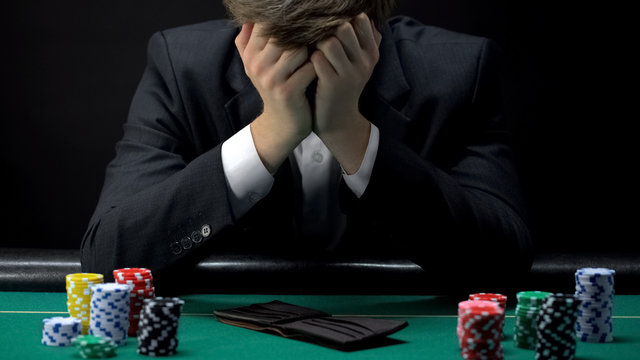
- Real Money Gambling
- Online Casinos
- Sports Betting
- Poker Sites
- Esports Betting
- Online Slots
- Blackjack
- Video Poker
- Texas Holdem
- Online Casino
- Sports Betting
- Sports Betting Sites
- US Sports Betting Sites
- Beginner’s Guide
- Football Betting
- How to Bet on Football
- NFL Betting Sites
- Super Bowl Betting Sites
- Reviews
- Popular Now
Help for Online Gambling Addiction
 Author: GamblingSites.org | Last Updated: August 2023
Author: GamblingSites.org | Last Updated: August 2023Even though online gambling has made the hobby more accessible to people that live far away from land-based casinos, it’s also caused some problems. Because gambling online is so popular, it’s made it easier for problem gamblers to feed their habit, and made it harder for them to stop.

In a 2022 article published by the Michigan State University, journalists noted that since online gambling became legalized in Michigan during Covid, they’ve seen a “rise in problematic play.” And other news sources confirm this kind of increase of gambling addiction, with some users saying that “being able to just sit in bed and go on my phone and gamble made it almost impossible to stop.”
The National Center for Responsible Gambling estimates that around 1 percent (2.09 mil) of the US adult population has a severe gambling problem. Younger people are thought to be more prone to gambling problems, with about 6-9% of the youthful population.
While we promote gambling as an enjoyable hobby, we also recognize that some people are predisposed to online gambling addiction, and we want to help.
We’ve compiled some of the best resources from around the web about identifying gambling addiction and who to contact to help overcome gambling problems.
Signs of an Online Gambling Addiction
You might not know you have a gambling addiction until you’ve recognized one of the signs or a friend/family member brings it up to you. A lot of gambling is innocuous, like placing a wager on a sports team or playing blackjack for a while at the casino. It’s when these things start to become frequent habits that you want to step back and consider the circumstances.
The Mayo Clinic lists some of the signs/symptoms of compulsive gambling as:
- Constantly thinking about gambling, or how to get more money for gambling
- Gambling with more and more money to meet the same thrill
- Having tried to cut back or stop gambling unsuccessfully
- Feelings of anxiety when you’re not gambling
- Using gambling to escape problems with work, family, or relationships
- Turning to gambling when you’re feeling depressed or helpless
- Trying to chase your losses or thinking “just one more game”
- Lying to friends and family about your gambling habits
- Asking others to bail you out of financial hardships as a result of gambling
- Stealing, or thinking of stealing, to use for gambling
Some of these signs can appear simultaneously or on their own, and it’s important to recognize that you might have a gambling addiction if you’ve experienced any of these. The next step is to explore some of the resources for people with problem gambling, which we cover in the next section.
Help Available for Problem Gamblers
There are a few resources available for problem gamblers. These helplines can connect you with a 100% confidential support team, and they can help you find licensed medical professionals in your area that you can meet with. All of these resources are available 24/7, 365 days a year, and are completely confidential.
- National Problem Gambling Helpline – Phone line and mobile text and chat services. Available in all 50 states, Canada, and the Virgin Islands. 1-800-522-4700
- Gamblers Anonymous – This national organization helps people connect with local GA groups or virtual meetings. Use their hotline directory to find a hotline in your state.
- SAMHSA’s National Helpline – This helpline is run by the Substance Abuse and Mental Health Services Administration, and can help connect you to local treatment, support groups, and other community organizations. 1-800-487-4889.
Conclusion
Certain people may be at more risk than others for gambling addiction. Compulsive gambling is often associated with other traits, like being very competitive or impulsive. Other disorders, like drug abuse or alcoholism are also associated with gambling addiction.
Studies also suggest that gender, age, and family status all play a part in the development of gambling problems. Yale researchers have been working with data that suggests a predisposition for gambling addiction about “50% due to genetic factors and 50% due to environmental factors.”
It’s important to recognize that having a gambling addiction doesn’t mean there’s something wrong with you. There are multiple risk factors and conditions at play, and sometimes these things manifest in certain ways. What’s important is that you recognize your gambling addiction before it becomes a larger issue and seek the necessary help.
GamblingSites.org DisclaimerThe information found on Gamblingsites.org is for entertainment purposes only. It is a purely informational website that does not accept wagers of any kind. Although certain pages within Gamblingsites.org feature or promote other online websites where users are able to place wagers, we encourage all visitors to confirm the wagering and/or gambling regulations that are applicable in their local jurisdiction (as gambling laws may vary in different states, countries and provinces). Gamblingsites.org uses affiliates links from some of the sportsbooks/casinos it promotes and reviews, and we may receive compensation from those particular sportsbooks/casinos in certain circumstances. Gamblingsites.org does not promote or endorse any form of wagering or gambling to users under the age of 18. If you believe you have a gambling problem, please visit BeGambleAware or GAMCARE for information and help.We're sorry, residents of your region are not accepted by this gambling site! OK